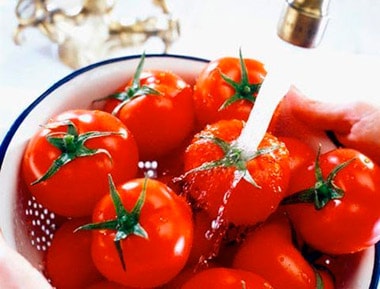Washing fruits and vegetables with clean water is not safe enough?
Using clean water to wash fruits and vegetables can only remove some types of bacteria, scientists confirm.
While rinsing a tomato under running water can remove many of the harmful bacteria, some of those microorganisms are resistant to the water. They actually cling to the fruit more, experts say.
The result could be an outbreak of Salmonella or E. coli in humans, even if we are vigilant.

The U.S. Food and Drug Administration (FDA) estimates that there have been 383 cases of Salmonella linked to contaminated tomatoes in 30 states since April 10, when the first patient was reported. The outbreak has been attributed to Salmonella serotype Saintpaul, an uncommon strain of Salmonella bacteria – a parasite that lives in the intestines of humans and warm-blooded animals.
To date, the FDA has not been able to pinpoint the exact source of the contaminated tomatoes. Even so, many scientists stress that the tomatoes could have been contaminated with the pathogen from contaminated soil, irrigation water, fertilizers, wild birds or even the farmers themselves.
“If the bacteria are on the surface of the produce and you just wash it with water, that might remove some of the surface bacteria. Unfortunately, rinsing with clean water doesn’t remove all of the bacteria, and that’s a problem. If they’re tightly bound together or living in a tight community called a biofilm, it’s very difficult to remove them,” Brendan Niemira of the U.S. Department of Agriculture’s Food Safety and Microbiology Service told Live Science.
Rough surfaces, like those on cantaloupe rinds or spinach leaves, provide plenty of nooks and crannies for bacteria to hide in. Tomatoes have a smoother surface, though their skins still contain tiny pores that can harbor bacteria, Niemira says.
You’ll need to wash rough-surfaced produce more thoroughly. But Niemira warns that scrubbing too hard can bruise or tear the protective coating on tomatoes and other produce.
This type of damage can lead to food spoilage and encourage the growth of bacteria that cause spoilage of fruits and vegetables. While these bacteria are not harmful to humans, they soften the fruit and provide a breeding ground for human pathogens such as Salmonella, Niemira explained.
The FDA does not recommend that people wash fruits and vegetables with soap, bleach, or commercial cleaners, but it does suggest some tips to help keep food safe:
- Handle fruits and vegetables gently to minimize bruising.
- Wash in cold water.
- Let food drain.
- Store food in the refrigerator (FDA recommends keeping the refrigerator at a maximum temperature of 4.5 degrees Celsius)
- Discard any fruits or vegetables that appear to be or have been damaged.
According to (Vietnamnet)-M.D






